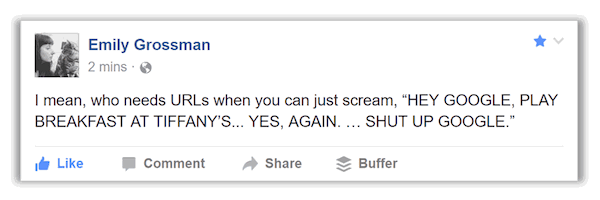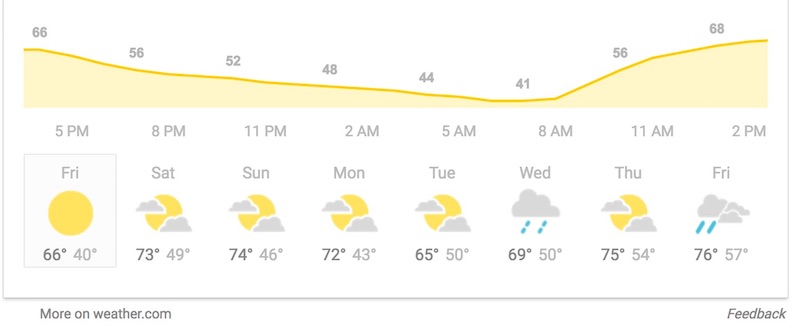Does a mobile-first world really mean the death of the browser? Are screens as we’ve known them a thing of the past? Are the days of online information residing at fixed URLs connected by links coming to a close?
In this episode of the Here’s Why digital marketing video series, Mark and Eric explain why Google’s move toward mobile-first indexing will mean radical changes in the way people access information, and therefore in the way we do SEO.
Don’t miss a single episode of Here’s Why. Click the subscribe button below to be notified via email each time a new video is published.
Resources
- Understanding Mobile-First Indexing: Long Term Impact on SEO by Cindy Krum
- All of our Here’s Why Videos
Transcript
Mark: Cindy Krum, of MobileMoxie will be one of the speakers at our Next10x conference this April, speaking about how mobile impacts our digital marketing. Now recently, she wrote a series on her blog about the dramatic changes for SEO in a mobile-first world.
Eric: One of the most intriguing predictions Cindy makes in the introductory post of her series is that in a mobile-first world, browsers will become less and less important.
Mark: And that’s a stunning prediction when you think about it. For as long as we’ve had the World Wide Web, our primary way of viewing internet content has been through a browser.
Eric: Of course, that’s already been changing. When I’m on my smartphone and want to look at Facebook or YouTube video, I don’t open a browser, I go straight to the app in each of those.
Mark: And with Siri on my iPhone or Google Now on an Android device or Cortana on a Windows Phone, I can do a search without opening anything. For example, if I’m in the Google app on my iPhone and say, “Okay Google, upcoming movies,” Google reads me a list of some of the movies soon to be released.
But what does all this mean for the future of search and for SEO in particular?
Eric: Well, as Cindy points out in her article, the amount of new information available through the internet is expanding at an exponential rate. Even Google knows they won’t be able to keep up with it all. So they’re starting to show a preference for information sources that make it easy for them to organize information. For example, sites that make use of schema markup for standardized data.
Mark: And Cindy says, for the same reason, we may be seeing of the loss of the URL, as the foundation of indexing for Google.
Eric: That’s right. Google’s index is like an old-fashioned card catalog in the library.

The index cards direct you to individual books at particular locations on the shelves. Now, in the traditional web…
Mark: It feels funny to call the web traditional, doesn’t it?
Eric: Yeah, it does. But in the World Wide Web we’ve known, URLs were generally the address, or shelf locations as it were, of individual web pages. But now, the internet, which is much larger than the web, contains vast amounts of information that can’t be pegged to a URL, and that can’t be displayed in a browser. That information is still valuable to Google, but it has to be accessed in different ways than the traditional URLs that a search engine uses.
[Tweet “Because of the diversity of data on the Internet, URLs diminish in importance for Google. More at”]
Mark: So take, for example, information that’s in an app. Siri or Google Now can surface a lot of that, but it’s not information they are finding at a URL. Rather, they are getting the data from a feed or an API or by some other means.

Eric: A similar thing happens with information from PWAs or Progressive Web Apps, and the so-called Internet of Things devices, and an ever-growing number of internet connected, but non-browser friendly sources.
Mark: So, what should SEOs be doing to prepare for this mobile-first outside the browser future?
Eric: Well, Cindy Krum and I agree on several recommendations for things you can do right now. The first is to understand and implement schema markup and JSON-LD. That’s beyond the scope of this video, but we’re preparing resources on these at PerficientDigital.com. Schema and JSON-LD are important because they provide shortcuts to useful data for search crawlers, bypassing their need to read your HTML or follow links to find it. They can place an identifier at the exact location of that bit of data, so they can resource it later.
Mark: Now, it may also be useful for large information providers to supply Google with direct feeds of their data, such as what weather.com does with visual information that shows up in a weather-related search.

Eric: Be aware that Google will be pressing to get more and more information in their cloud, so they don’t have to continually access it from our sites.
[Tweet “Google wants more of the world’s data in its cloud so it doesn’t have to access it from sites.]
AMP or Accelerated Mobile Pages, are an example of that, that we’re already seeing in mobile search results already. When you click on an AMP result, you aren’t going to the site that originated the content, rather you’re seeing a cloud-resident, specially formatted version of the page that Google has uploaded to its servers earlier. The result is better for the end user, a faster page load, and often more mobile friendly format, but much more cost effective for Google as well.
Mark: And cloud-resident data can also be made device agnostic. That is, it can be formatted for any device or even not formatted all, but simply presented as raw data. Such as your phone’s voice telling you what your next appointment is.
Eric: So to sum it up, Google’s move towards mobile-first indexing means less dependence on some of the traditional staples of the web, such as URLs and browsers, that our SEO world has depended on up to now. Google will want more direct access to your information and expect you to structure it in ways that make it easy for them to identify. And more and more of the results experienced by end users will come from Google’s cloud, rather than straight from our websites. One challenge would be how to continue to operate useful revenue generating online businesses in such an environment.
Mark: Now, to help you meet that challenge, we’ve created Next10x: Mastering Mobile Digital Marketing. A one day conference in Boston, Massachusetts, where you can learn the critical elements of mobile digital marketing in a mobile-first world, from expert speakers like Cindy Krum, whose work we discussed in this episode.
Eric: To find out more about Next10x, click here.
Mark: And don’t delay, seats are limited and the conference takes place April 5th, 2017. We hope to see you there.


Yes definitely we use apps to consume contents, listen podcasts, watches videos and more. Even i am also watching your video series on my Youtube app each and every monday morning.
Another app I use Quora for marketing purpose and getting tons of traffic to my website without use of browser.
Hey Guys,
Is there any official Google announcement that, “[e]ven Google knows they won’t be able to keep up with it all” with respect to the amount of information on the Web? I ask that because I haven’t seen any indication that Google is resource-limited.
From what I’ve seen, Google is steadily improving its ability to “understand” all kinds of online content. So what’s more important? Content quality or the use of schema? Hopefully you’d be focused on both, but I’d vote for content quality every time.
Thanks!
Paul
Hi Paul, thanks for the great questions. We know for a fact that Google doesn’t even try to index everything available on the web now. Remember, we’re talking about the whole process of crawling, indexing and ranking plus storing all that data. So even now Google is selective about what it indexes and stores in its database. Why? Because as huge as Google’s capacities are, they don’t have unlimited resources, but also because it’s not necessary. A great deal of what exists on the web is not something anyone is likely to be searching for. So they apply multiple qualifiers in their algorithm to determine what’s worth indexing.
As for content quality vs schema, there’s no argument that content quality should be your first priority. If your content stinks, or is just misaligned with your audience, no amount of schema, tagging, or other SEO tactics can save it. But once you’re doing a good job with your content, things like schema become crucial to helping search engines do an even better job of matching your content with the right searchers.
Hi Sarfraj, we’re truly grateful that you look forward to our videos every week. We’re glad they are helping you! Thanks for sharing those great examples of how the web is moving beyond the browser, especially on mobile.
Great post and video Mark and Eric. I’ve been trying to get visualise just how Google is dealing with the wealth of data that simply isn’t being generated by traditional means. Couldn’t agree more that schema mark-up is a definite consideration for any site.
Have you any data how AMP pages are being received in terms of any client feedback or reports that you’re aware of? Seems a big step to take to lose much of your formatting for the potential reward of being in front of the competition. Any proven case studies on the topic would be really welcome.
Thanks Mark, you’re absolutely right. I was thinking of websites intended for business marketing and not all data on the Web.
Thanks again for your response!
Paul
Easy error to make, I know, because normally that’s all I think of, too! That was part of the purpose of our video, to make people aware that the internet is way, way bigger than what we usually think of (confined mostly to the WWW). Great interacting with you!
Thanks, Guy. It’s too early for any case studies, but we’re keeping a close eye on what’s happening with AMP. Primarily, we’ve been experimenting with it for our own site. We have to say that the AMP presentation of our posts is great looking…and of course lightning fast! The biggest disappointment so far is how broken the analytics are. There are a number of well-known issues that Google says they are aware of and working on, but they’ve been around for months now. Once we know we’re getting accurate metrics, we’ll be able to make a better assessment.
By the way, I just listened to Eric’s interview on the Digital Entrepreneur podcast while feeding the horses (it’s what we do in Texas). It’s the best explanation I’ve ever heard of the intersection of SEO and Content Marketing. Loved the statistic regarding the rankings of videos in “how to” searches. Thanks again!
Yeah, there’s really no need for them to index the entire Internet. Pages/sites, for instance, that have a snowball’s chance in Hades of ever ranking for anything other than their domain name – why consume storage resources for that? Which brings up an interesting question, though:
If they’re thinning the amount of the Internet they keep in their index, to what degree? For instance, a site: search for mostobscurepageonline.com wouldn’t return much of anything save perhaps the homepage. Or might they go ahead and index only the URL, response code, title and description, but not the content? That would make more sense, it seems, although it wouldn’t free up quite as much “space” in their cupboard.
Of course, only Google can answer that for sure, but from Google engineers I’ve listened to, my impression is not that they are “thinning the amount of the internet they keep in their index,” but rather continuing to grow the index while the Internet as a whole is growing faster. So it’s probably more of a widening gap because the data side is expanding faster than the indexation side, even though the indexation side continues to grow and expand capacity.
Thanks Paul, so glad you found it helpful!
Would love to be at Next 10X but too far to come from Sydney (Australia) for a day. Would you perhaps consider selling some sort of virtual package?
Bron
Unfortunately, we aren’t setup to do this for the conference this year. Perhaps we can next year!
Worthful discussion. This is how google is evolving search with PAA (People also ask), mobile first and other major changes based on artificial intelligence. Keep up updated Mr. Eric. Thanks for the post.
Thanks for sharing this useful information with us !